A month ago World of Reel ‘s Jordan Ruimy reported that Thierry Fremaux was looking at bumping the 2021 Cannes Film Festival from the present July slot into October. Now Showbiz 411’s Roger Friedman is reporting the same thing. I’m sorry but how can Cannes be viable in the immediate wake the big four fall festivals (Venice, Telluride, Toronto, New York)? Best to plan for May ‘22.
 Jeffrey Wells
Jeffrey Wells
Feldman Encounter at Izzy’s Deli
Roughly 30 years before Hollywood Elsewhere became a huge, earth-shaking deal, I ran into the great Marty Feldman at Izzy’s Deli (1433 Wilshire Blvd., Santa Monica). It was sometime in early ‘75, 9 or 10 pm. The place was fairly crowded. I had ordered and eaten, and was alone at a table for four. On top of which I was in a sullen mood, reading something. The gracious thing, of course, would have been to sit at the counter.
Anyway suddenly there was bug-eyed Marty Feldman, half leaning over and asking if I was feeling well and good. “Good?” I replied. “Yeah, I guess. Why do you ask?” Marty (not missing a beat): “Because we’d like to join you.”

I knew who he was, of course. And I knew, of course, that he was basically nudging me along. He was saying what Eyegor’s father used to say to his son…”What the hell are you doing in the bathroom day and night? Why don’t you get out of there and give someone else a chance?” Except he was actually saying “uhm, Izzy’s is very crowded and here we are, four fine people looking to spend a bit of money on Izzy’s food, and you’re being a table hog.”
Being the sullen type, I ignored Feldman’s suggestion about sharing the table because it seemed inconceivable that he and his wife (accompanied by another couple) were even vaguely interested in my company. So I grumpily took the hint, got up, paid the bill and walked out.
After watching the Last Remake of Beau Geste Bluray I was saying to myself, “Idiot! You could’ve smiled and said ‘sure, sit down!’ and spent a few minutes with a great fellow and his wife and friends before beating a graceful exit. Brilliant, Jeff!”
But that was me back in those days. Morose, depressed, vaguely self-loathing.
Update: HE commenter “Jeff” reminds that Izzy’s was called Kenny’s in the mid ’70s, and that Kenny is/was the dad and Izzy is the son. I’d forgotten this completely.
Marty Feldman Chronicle, Part 1
I never saw Marty Feldman‘s The Last Remake of Beau Geste, a surreal genre farce, when it opened in mid July ’77. I was scared away by critics who said it was inventive but overly broad and not funny enough**. They also complained that swollen-eyeballs Feldman was better as the offbeat comic ensemble guy than a star — that he didn’t have the charisma or gravitas or whatever.
And so, to be honest, I was a little bit reluctant to sit down with a recently arrived Kino Lorber Bluray version. But I’d heard that the commentary track by director-writer Alan Spencer was exceptional, and so I finally watched it last night. The Spencer version, I mean, and I was knocked dead flat by how enjoyable it all felt.
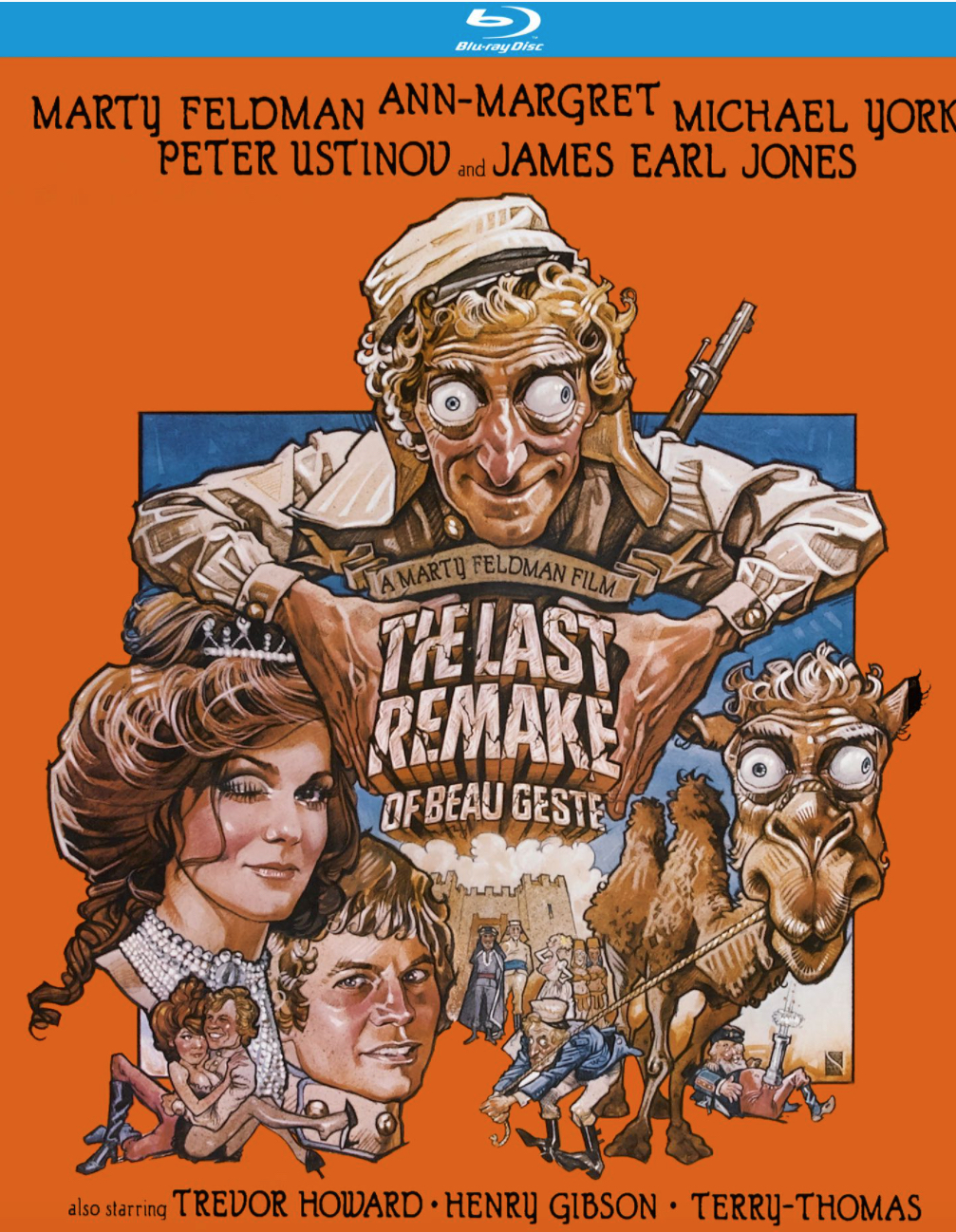
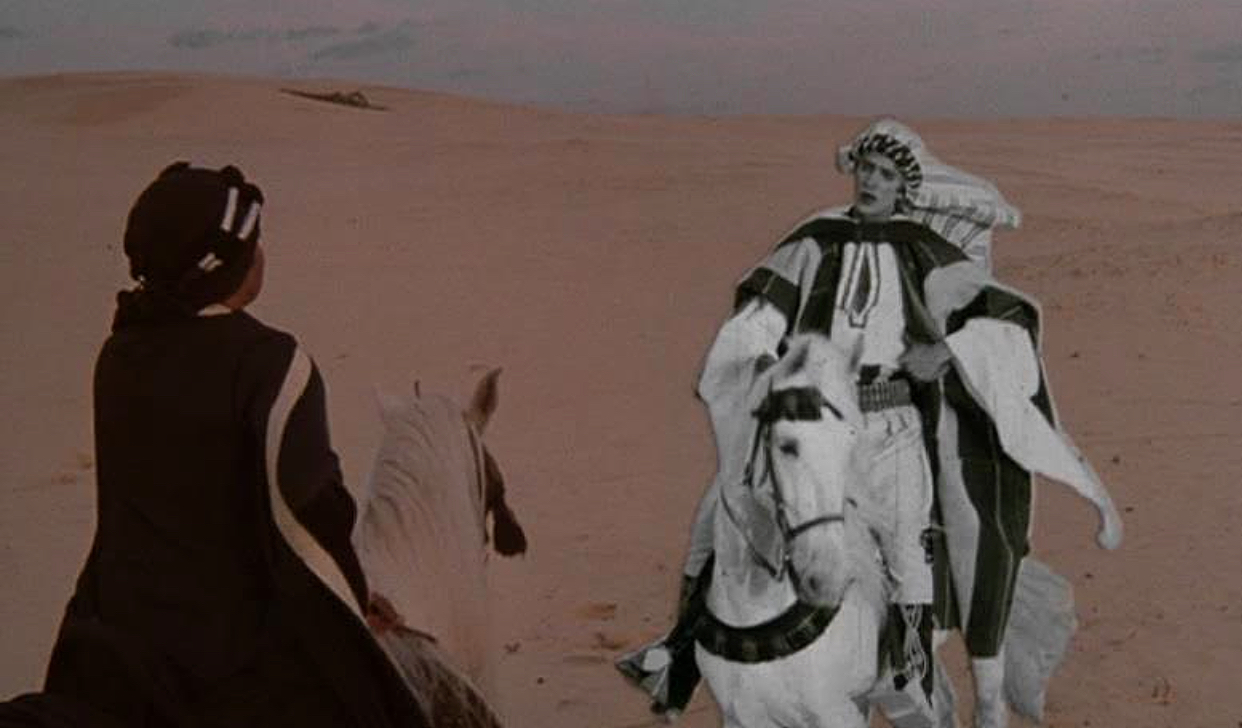
Really. Seriously. I sat right up on the couch and stayed that way all through, pretty much marvelling at how wise and intimate, amusing and flavorful Spencer’s recollections were, start to finish. This may be the wrong thing to say, but Spencer’s guide-tour version of Feldman’s film is so good that I almost don’t want to watch the pure-Feldman version. Yup — definitely the wrong thing to say.
Just for emphasis: Spencer’s Beau Geste is the best Bluray audio commentary I’ve listened to (and savored) since the heyday of audio commentaries between the mid ’90s and early aughts. It’s as nourishing as John Frankenheimer’s The Train commentary track, which I first heard in the mid ’90s on laser disc. It’s also in the same realm as the Steven Sodebergh-Lem Dobbs commentary for The Limey, and the Soderbergh-Mike Nichols commentary for Catch 22.
Everything Spencer passes along is droll and assured and totally first-rate — hugely engrossing, no flat spots, dryly amusing, chocked full of knowledgeable inside info about Feldman’s feverish creativity and the big fight he had with Universal when they went behind his back and cut and released their own version of the film, which was more on-the-nose conventional and less crazy-surreal-Pythonesque, as Feldman intended.
I wish someone could resurrect the original “Martyr” Feldman version, which used a flashback structure.
The Spencer journey isn’t just an informative listen but an emotional one, as Feldman and Spencer were friends and allies. Feldman befriended a teenage Spencer when the latter snuck onto the 20th Century Fox set of Young Frankenstein in ’73, and from that point on they were bruhs until Feldman’s heart-attack death in late ’82, at age 48.
Tonight I’ll be listening to Spencer’s narration track of Feldman’s In God We Tru$t (’80), which I also ducked. The commentary is more serious as heavier stuff went down during the making of this modest, unsuccessful comedy.
Wolfe Reminds, History Repeats
In a Promising Young Woman thread, I noted this morning that ’20 and early ’21 have been an especially weak year for the kind of rich undercurrent award-season films that less–than–woke, middle–class people (including X–factor types like myself) tend to respond to and pay to see.
For since wokeness began to take hold in ’18 and certainly since the pandemic struck 13 months ago, the movie pipeline has been losing steam and under-providing, to put it mildly. Nothing even approaching the level of Spotlight, Manchester by the Sea, Call Me By Your Name, Dunkirk, Lady Bird, La-La Land, the long cut of Ridley Scott‘s The Counselor, Zero Dark Thirty or Portrait of a Woman on Fire has come our way from domestic filmmakers. **
Above and beyond an array of pandemic suffocations, a significant reason for the strange absence of robust cinema, for this general faint-pulse feeling, is (wait for it) wokeness and political terror.
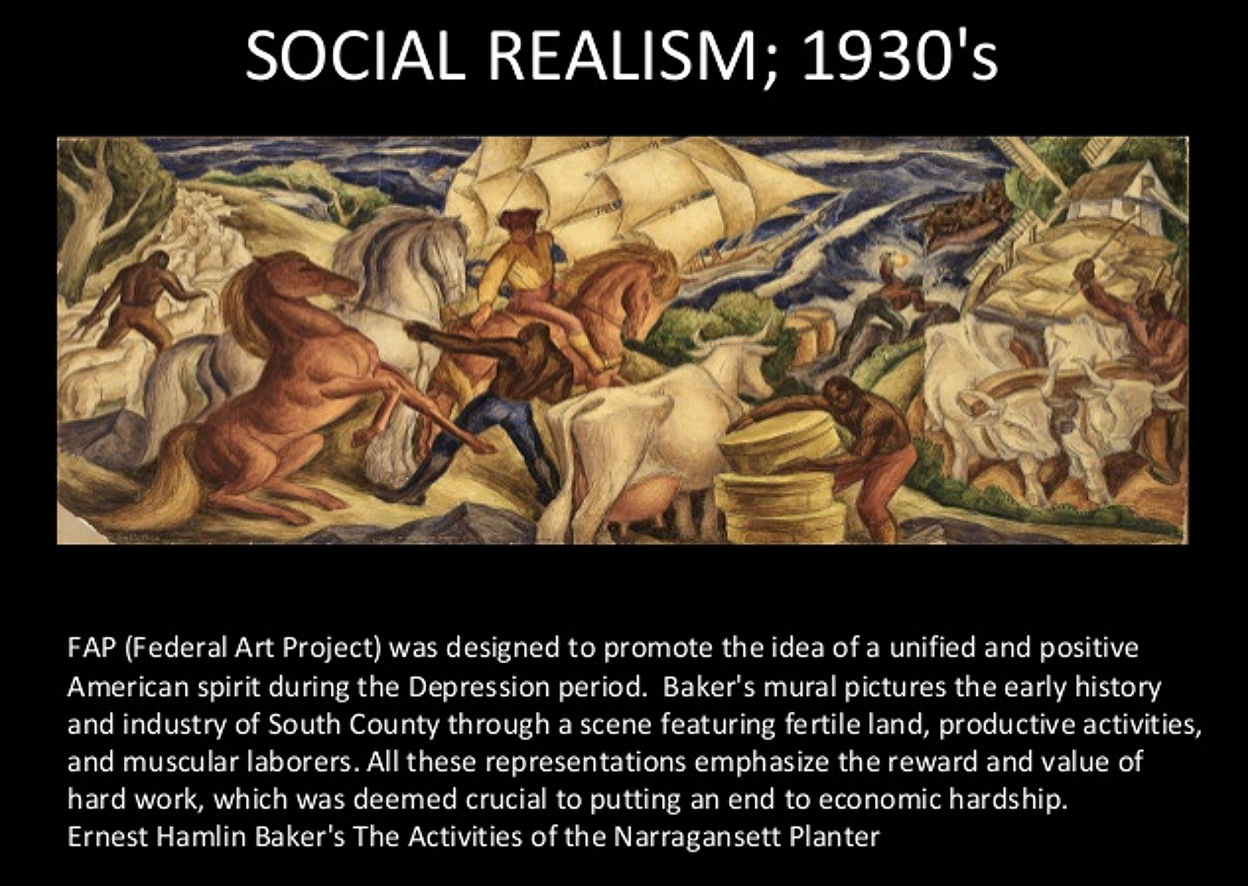
Wokeness might be good or (sadly) necessary for social change, but it’s not much of a propellant for the creation of knockout award-season flicks that really reach out and touch Joe & Jane Popcorn.
The bottom line is that the erratic pursuit of sweeping, penetrating, soul-touching art (a rare achievement but one that has occasionally manifested over the decades) has been more or less called off, it seems, because such films or aspirations, in the view of certain #MeToo and POC progressives, don’t serve the current woke-political narrative.
You can dismiss the previous three paragraphs as a typical, broken-record HE rant. But there is, in fact, a historical precedent for what’s going on right now, and it’s nicely recounted on page 30 and 31 of Tom Wolfe‘s “The Painted Word“.
The passage is only two paragraphs long. Would you like to read it? Because what happened in the modern art world in the 1930s — i.e, the dominance of “social realism” — precisely mirrors what’s going on today.
For upscale, sensitive-person, social-reflection dramas have fallen under the influence of a new form of ’30s social realism and, it could certainly be argued, are being used to illustrate and argue against social ills that wokesters regard as evil and diseased. The result has been a new form of enlightened propaganda cinema. (Feel free to supply your own examples.)
It’s almost astonishing to read Wolfe’s description of the “social realism” movement of the ’30s because the same damn thing is happening right now.
For the making of cinematic art, like canvas art of the ’30s, has been more or less (or at least partly) “called off” in favor of serving the woke/thought revolution. For film artists of today, to paraphrase an old Barnett Newman observation about the ’30s, are residing “in an intellectual prison that [locks them] in tight.”
Read the following “Painted Word” passage and tell me this isn’t a dead-to-rights portrait of 2021:
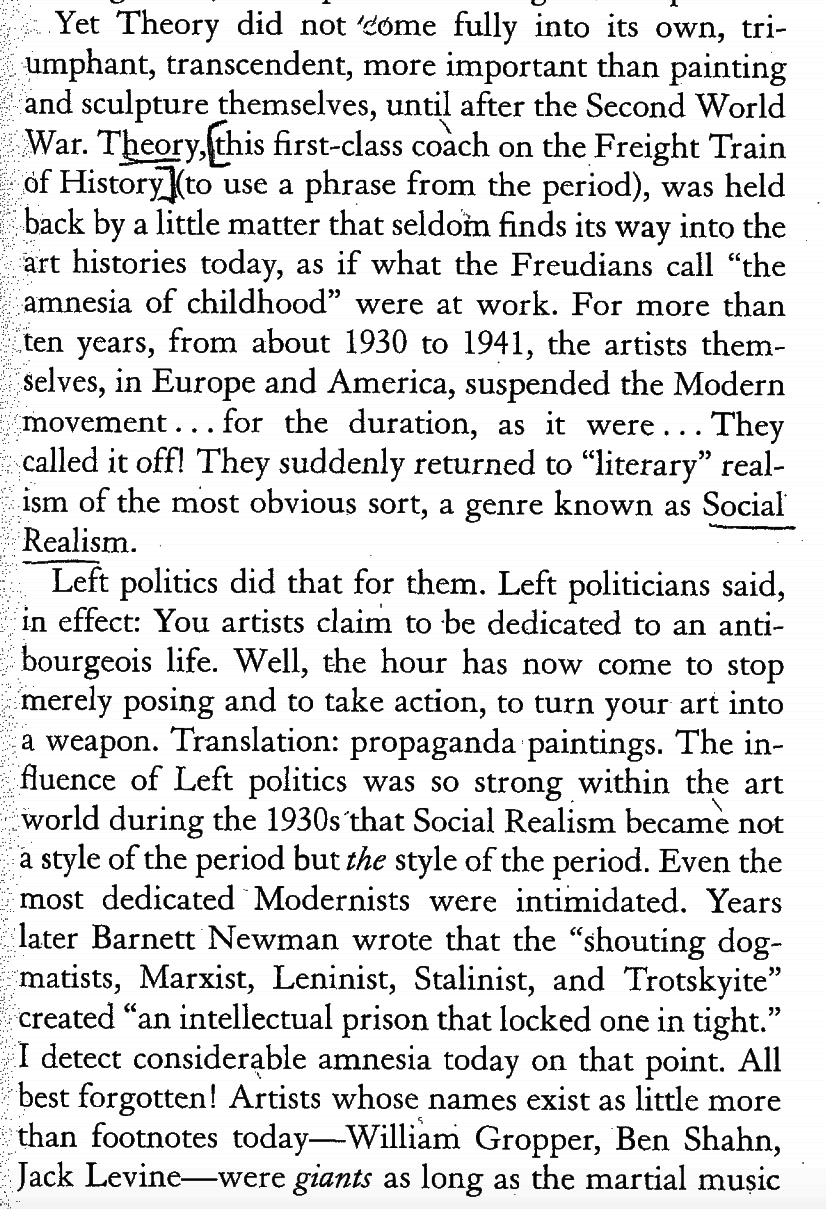
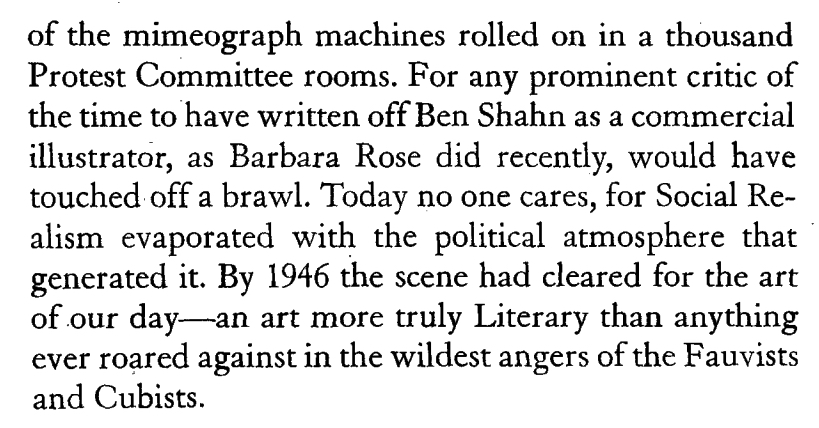
Film Snob
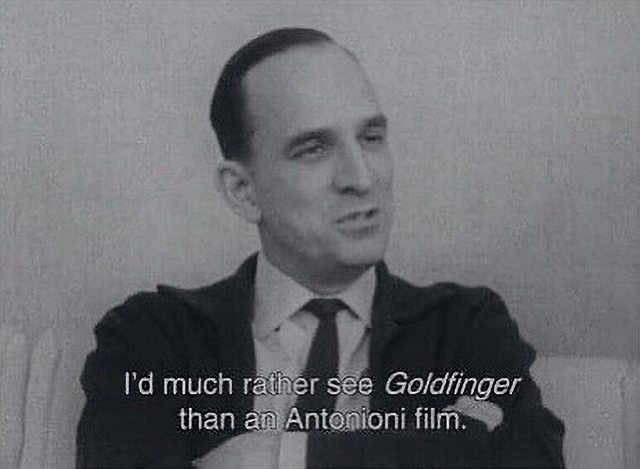
From “The Film Snob’s Dictionary“, published on 2.21.06:
“The Film Snob prides himself on his populist, un-arty taste, favoring, for example, the soapy, over-emotive schlock of India’s Bombay-based ‘Bollywood’ film industry over the artful, nuanced films of the Calcutta-born Satyajit Ray, and the Spaghetti Westerns of the Sergios (Leone and Corbucci) over anything Fellini ever made. It’s a Reverse Snobbery more powerful than the Snobbery it’s rebelling against.
“The archetypal Film Snob is familiar to anyone who has walked through the doors of an independent video store and encountered a surly clerk—hostile of mien, short on patience, apt to chastise you for not intuiting that Wes Anderson’s Bottle Rocket is grouped in the ‘James L. Brooks‘ section ‘because Brooks was the movie’s executive producer!!!’
“Perhaps this clerk has a shelf-ful of his own recommendations on display — David Cronenberg’s Scanners, the complete filmography of Steve Zahn, the Italian women-in-prison pic Women of Devil’s Island, and, oh, The Human Tornado, the second of the raunchy ‘Dolemite features that starred the blaxploitation comic Rudy Ray Moore in the 1970s.
“As you walk up to the counter with your copy of Ron Howard’s A Beautiful Mind, this clerk heaves an audible, exasperated sigh, dutifully but contemptuously processing the transaction and sending you on your way with your wretched cinematic piffle.”
Fennell’s WGA Win
Congrats to Promising Young Woman‘s Emerald Fennell for snagging the WGA’s Best Original Screenplay trophy. I don’t happen to agree that the script of PYW deserves this honor as I don’t respect the last-minute Bo Burnham twist.
If Fennell had cowritten PYW with, say, Ben Hecht or Robert Towne or Billy Wilder, they all would have told her the same thing: “You can’t build a character into a nice guy for 100 minutes, and then pull the rug out and change him into a passive-aggressive rape apologist at the drop of a hat. If you want to do that, you have to set it up…you have to plant clues and indications early on.”
Posted on 3.10.21: The notorious ending of Alfred Hitchcock‘s Suspicion (’41) delivered one of the most indigestible main-character switcheroos in film history.
“From the very beginning Cary Grant‘s Johnnie Aysgarth is a selfish, immature, financially irresponsible swindler. Toward the end the audience is led to believe Aysgarth may even be a murderer. But just before the 99-minute film concludes, he abruptly reverses course, confesses his many sins, drapes his left arm around Joan Fontaine‘s shoulder, and all is well.
In other words, the Grant-Aysgarth character arc is “charming but penniless rake, ne’er-do-well, lazy good-for-nothing, embezzler, liar, possible slayer of business partner, possible poisoner of his wife, bad, bad, bad, worse, worse, worse…then everything’s fine!”
Emerald Fennell‘s Promising Young Woman will almost certainly land a Best Actress Oscar by way of Carey Mulligan‘s zeitgeisty performance. And yet it must be acknowledged that the character arc of Bo Burnham‘s “Ryan Cooper”, a youngish pediatrician who falls for Mulligan’s Cassie Thomas, is somewhat similar to Grant’s.
The trajectory is “nice guy, sincere guy, considerate guy, emotionally mature guy, gently-in-love guy, introduce-him-to-the-parents guy, even-nicer guy and then…..screech, hit the brakes!…rape-bystander guy who’s friendly with Chris Lowell‘s ‘Al the rapist’ and who lies about Cassie’s whereabouts to the police after she turns up missing.”
The difference is that Burnham’s 180 comes around the 104-minute mark in a 113-minute film while Grant’s turnabout happens during the final 90 seconds.
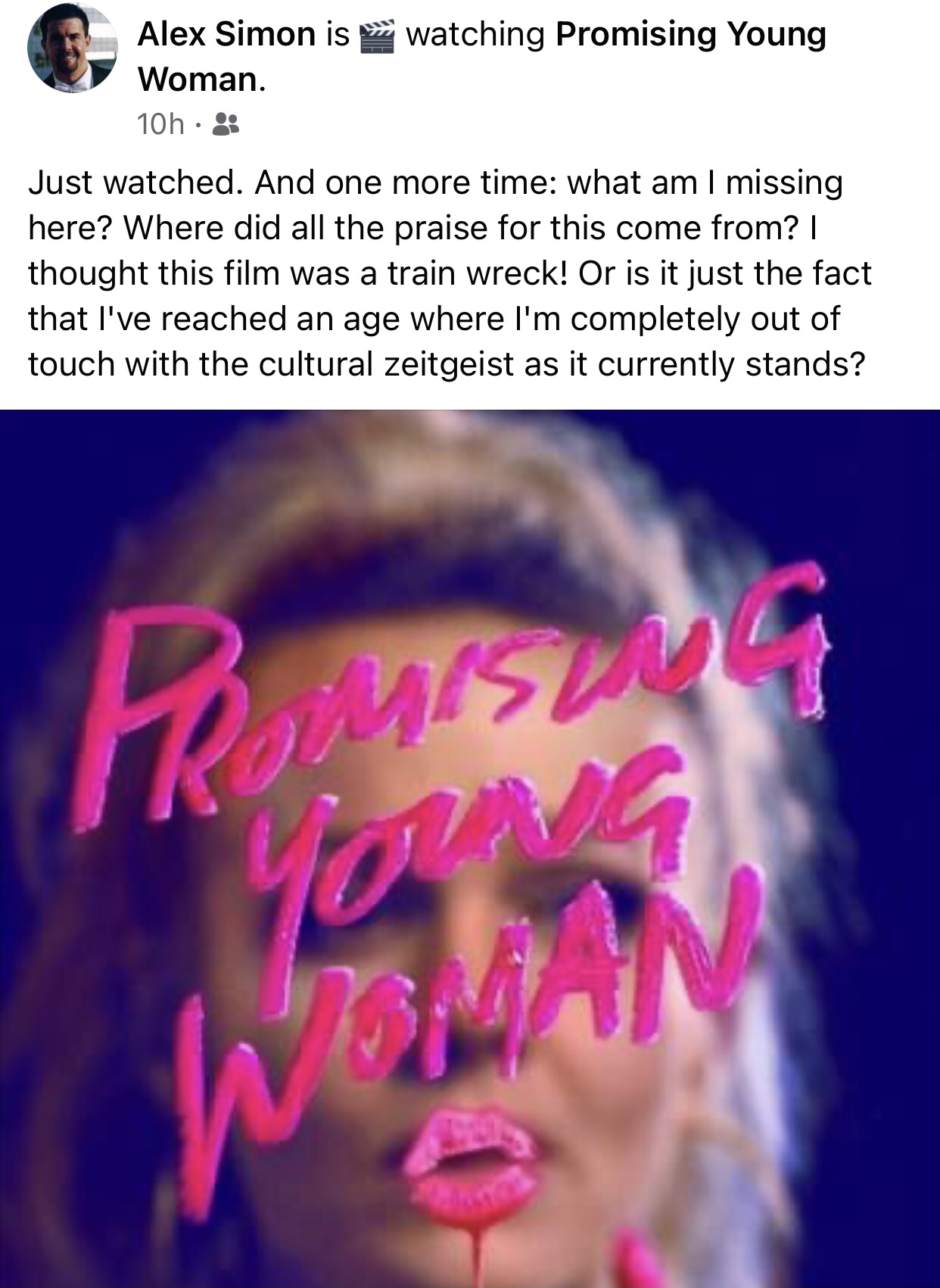
Shocker
#GodzillaVsKong is "fine." Terrific effects work and an engrossing second act, but it's another "retrofitted and pared-down for the masses" "course correction," w/ most of the worldbuilding absent & little reason for its existence beyond preemptive promises. Your kids will enjoy. pic.twitter.com/9SdpMQtKwh
— Scott Mendelson (@ScottMendelson) March 21, 2021
I Could Write A Book…
…about the whole 40-year saga that includes Hollywood Elsewhere, which is now 16 and 1/2 years old… the whole exciting, up-and-down, anxiety-fraught journey of pain and glory, euphoria and dogged reporting, intrepid workaholism and, yes, spotty alcoholism until the dawn of sobriety on 3.20.12…the whole magilla, 40 miles (or was it 500 miles?) of alternating pavement and potholes.
I know that “life of an exceptional movie maniac” books only sell on the coasts, and only to film devotees at that. But I have the whole eccentric oddball thing to work with, and a pattern of having gotten into trouble from time to time. So there’s a little bit of a flirting-with-danger element, a spritz of of James Caan‘s character in The Gambler, that line of country. The brief career blow-ups would be so much fun to recall.
Plus four or five decades worth of great stories, not to mention all the angry, painful and lonely upbringing-in-a-suburban-gulag stuff plus the usual sex, movies, drugs and rock ‘n’ roll material that was par for the course among young lads in the ’70s and ’80s. It’s the charge, the bolt, the buzz…the sheer fuck off-ness of it all.
Every half-talented writer has at least one decent book in them. I’ve got a bountiful tale of lust and incaution, and I could weave in 30 years of reporting, reviews and trend pieces going back to ’91 or thereabouts. Plus fights with my father, getting held on a suspicion of murder beef in South Carolina, a nearly fatal wipeout in rural Wisconsin, throwing up while leaning out of a Chevy Impala on a quiet road in Southport, the Great LSD Boston Freakout and the discovery of “the fear”…all of it.
Would I buy a book like this (i.e., in the vein of Owen Gleiberman‘s excellent “Movie Freak” only with a slightly crazier arc)? Yeah, but I’m atypical. What about an Average Joe or Jane who watches one or two movies a month, if that, and occasionally reads celebrity bios and mostly gravitates toward fiction when he/she wanders into a book store? What about them?
Sales would most likely be modest, be honest, but I could at least dine out on the book once it’s finished and circulating. Plus yesterday I came up with a title that I know would pique the interest of the above-described consumer:
LAST HONEST ASSHOLE: Life of an Intemperate Hollywood Columnist.
I would pick that book up, for sure. So would quite a few others. The first three words would be meant ironically, of course — okay, irony plus a few slivers of truth. There would also be those (the David Polands, the wokesters) who would take it literally, and that’s fine.
It’s half-written already. Much of the work to come would just be enhancing, re-arranging, re-writing, re-editing and so on. Not a difficult effort.
There have been a ton of “my life as a savvy film maven” books, but this would have more of self-doubting, self-flagellating, “who am I really?”, life-is-short-and-hard-and-then-you-die quality mixed with torrents of film fanaticism and blah blah blah.
I don’t have to write this, but I could easily bang it out. And I’d certainly like to.
Another “Third Man” Issue
May I confess something else about Carol Reed‘s The Third Man (’49), an opinion that no film buff is allowed to hold, much less convey? A view that only a very bad person would share in the first place? An opinion so outre and unmentionable that…well, I’ve said it.
I don’t like the damn zither music. I’m sorry but it’s always irritated me. Zither music is fine for a scene or two, but it’s heard through the whole film and after a while you feel worn down, and it’s like “enough already.”
I recognize, obviously, that the zither is The Third Man and vice versa. It’s the signature element, much more so than the ferris wheel or the deeply shadowed sewers or the cuckoo clock or that final scene in which Alida Valli walks right past Joseph Cotten outside the cemetery.
“Aww, Shit, Sonny…”
A great political backroom story, told first-hand by three guys — John Connolly, Bobby Baker and Eliot Janeway — who were right there. Beautifully edited by David Grubin.
Anti-Mask Assholery vs. Miami Pepper Balls
CNN: “Miami Beach Police fired pepper balls into crowds of partiers and arrested at least a dozen people late Saturday night as the city took extraordinary measures to crack down on spring breakers who officials have said are out of control.
“The aggressive enforcement actions came just hours after Miami Beach Mayor Dan Gelber declared a state of emergency and set an 8 p.m. curfew, saying the crowds that have descended on the city recently are ‘more than we can handle.’
“‘Too many are coming, really, without the intention of following the rules, and the result has been a level of chaos and disorder that is just something more than we can endure,” Gelber told CNN’s Ana Cabrera.
“On Saturday night, hundreds of mostly maskless people remained in the streets well after the 8 p.m. curfew. With sirens blaring, police opened fire with pepper balls — a chemical irritant similar to paint balls — into the crowd, causing a stampede of people fleeing.
“More than 1,000 people have been arrested in Miami Beach since February 3 as spring break travelers have come to the city, Miami Beach City Manager Raul Aguila said during an emergency commission meeting Sunday. Of those arrests, more than 350 have been felony arrests, he said.
“Both Aguila and Gelber said the spring break crowd is not typical and they don’t believe it’s mostly students traveling down.
“‘These are individuals coming into the city…to engage in lawlessness and an anything-goes party attitude,’ Aguila said.
“While the city had been dealing with large crowds, Aguila said, things changed Friday when thousands gathered on Ocean Drive. There were no special events planned, and none of the people were patronizing restaurants or establishments, he said.
“‘It looked like a rock concert — you couldn’t see pavement, you couldn’t see grass — all you could see was wall-to-wall people,’ he said.
“Gelber said the city is an appealing destination for travelers due to its good weather and open businesses, but it is still dealing with a pandemic. There are still 1,000 infections reported daily, and 50 to 100 people checking into hospitals each day in Dade County, Gelber said.}
Underwhelming Characters
The usual deciding factor in whether or not a viewer likes a film or not is the presence of — major revelation! — likable or at least engaging characters. (And I’m saying this knowing, as we all do, that Jack Nicholson is “likable” in The Shining.) The opposite is also true, of course. If a good film has an especially dislikable major character, viewers are usually (or at least often) inclined to dismiss the film as a whole.
Joseph Cotten‘s Holly Martins has always been my main…actually my only Third Man stumbling block. I’ve been watching Carol Reed‘s 1949 classic since I was a teenager (my father turned me on to it), and time and again Martins has kept me from truly enjoying this otherwise brilliant noir.
Orson Welles‘ Harry Lime is the charming, charismatic headliner, Alida Valli is the most mysterious, Trevor Howard is unassumingly droll and matter-of-fact, and Cotten is a pill — a dour, uncomprehending, sour-faced drag.
Today I happened upon a commentary track on Studio Canal’s The Third Man Bluray, and two great directors, Tony Gilroy and Steven Soderbergh, kicking it around:
Gilroy: But Joseph Cotten….he’s empty…
Soderbergh: He’s a really unique presence in this. He came from the Mercury Theatre, and wasn’t really in movies before Welles put him in movies. [And] I always liked him enormously. He was perfect for this…this kind of part. It’s very possible, in a sense, to cast somebody [for this role] with too much personality.
Gilroy: He has to be lost and he’s just…so lost. It’s not [a matter of his] being sympathetic or unsympathetic. He’s just a shabby character all the way around, and his empty…his naivete and emptiness. It would be hard to take an established movie star with a really strong, established personality…
Soderbergh: And have him be that.
Gilroy: Either have him deliver that performance, ask him to do that, or find it along the way and have it work. But [Cotten] is so…he’s such a slug.
Please name some significant characters who are such a drag to hang with that they damn near kill otherwise good films.
